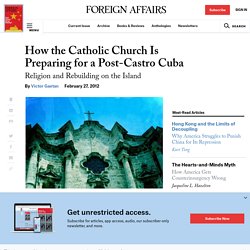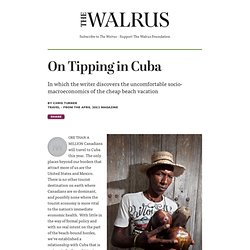

How the Catholic Church is Preparing for a Post-Castro Cuba. The Cathedral of the Virgin Mary of the Immaculate Conception in Havana.

(Kimli / flickr) When Pope Benedict XVI visits Cuba next month, he will once again reinforce a strategy that the Vatican has allowed the local Catholic Church there to pursue for more than three decades: diligently avoid any political confrontation with the Castro regime, collaborate with Havana to combat the U.S. -led embargo, and support the Cuban government's incremental economic reforms. After half century, Cubans again celebrate Good Friday. “On Tipping in Cuba” by Chris Turner. Ore than a million Canadians will travel to Cuba this year.

The only places beyond our borders that attract more of us are the United States and Mexico. There is no other tourist destination on earth where Canadians are so dominant, and possibly none where the tourist economy is more vital to the nation’s immediate economic health. With little in the way of formal policy and with no real intent on the part of the beach-bound hordes, we’ve established a relationship with Cuba that is unique in both our histories.
We’ve colonized Cuba on vacation by accident. This is a story about what happens when the unarticulated, half-hidden nature of that colonial relationship is suddenly exposed. So let’s begin, in fairy-tale fashion, in a tower atop a castle: the rooftop terrace of Hotel Casa Granda in Santiago de Cuba, the country’s second-largest city. . * Photography credit withheld at the artist’s request. ** To protect individuals’ identities, some names have been changed. Cubans embrace enterprise - Wire Lifestyle. 50 years of Castro: Timeline of Fidel Castro's rule in Cuba. "Tweeting to Havana" by Esther Dyson. Exit from comment view mode.

Click to hide this space HAVANA – I was taking my usual morning swim, but this time on the roof of the Parque Central hotel in Havana, where the sun does not rise until 6.30 a.m. even in May. In the dim light, I saw a man poolside. He told me that the pool opened at nine. I apologized. But he did not leave. It was not inconceivable, though it was unlikely. In fact, the two passive dissidents had said little. In theory, Pardo and his friend Antonio Rodiles want lots of things, such as regime change, a free economy, and other things too disruptive to mention. As in most countries classified as “unfree” by human-rights organizations, enforcement of the law can be arbitrary. The obvious route to change for Cuban dissidents would be to leave – as so many have done, often at the government’s invitation. I thought hard – and checked with Pardo and Rodiles – before publishing this column.
A flood of money coming into Cuba would not necessarily help. Supporting the Cuban Revolution at a Distance. Yusimí Rodríguez Photo: Edwin Wiebe HAVANA TIMES, April 9 – Something strange often happens when I am with a foreigner and I criticize the system we have in this country. They’re taken aback and rebuke me for being ungrateful, naive, and ignorant, in daring to criticize the reality in which I live because I don’t know what the reality is like in other countries. Theirs, for example. Many of them are young students from neighboring countries on the continent, even from the United States, that do not have the opportunity to get a university education in their home country. I understand their gratitude. The Real Cuba. ‘Spring’ delayed as Cuba follows China's model. Pope Benedict XVI’s call for “authentic freedom” during his recent visit to Cuba is unlikely to result in any early conversion to democracy.
Communism will remain an excuse for authoritarian, one-party rule in that benighted island. A Cuban “spring,” modeled on events in the Arab world, is not about to blossom. Skip to next paragraph Subscribe Today to the Monitor Click Here for your FREE 30 DAYS ofThe Christian Science MonitorWeekly Digital Edition But if party rulers were quick to rule out any prospect of political reform, other factors suggest economic changes are under way. Raúl Castro, who succeeded his ailing brother Fidel in the presidency, announced last year that half a million government workers would be laid off and that the creation of small private businesses would be encouraged.
That has not happened as speedily as projected, but there is substantial progress in shifting from an all-government-employed workforce to a newly created private sector of small businesses. Analysis: Springtime in Cuba? The World Factbook. Cuba. Skip to main content World Malaria 2014 Access Search Advanced search Navigation Language عربي 中文 English Français Русский Español Countries Cuba Map This map is an approximation of actual country borders. Statistics Contact information Señor Representante de la OPS/OMS Di Fabio, Dr José Luis P.O. Telephone: +53 7 8382526 Facsimile: +53 7 8332075 pwr@cub.ops-oms.org Country Office web site Regional Office web site Health profile WHO collaboration Mortality and burden of disease Nutrition Risk factors Features Cuba – Battling cancer with biotechnology 30 January 2013 You are here: Quick Links.